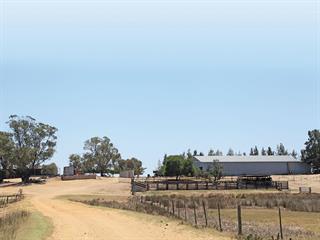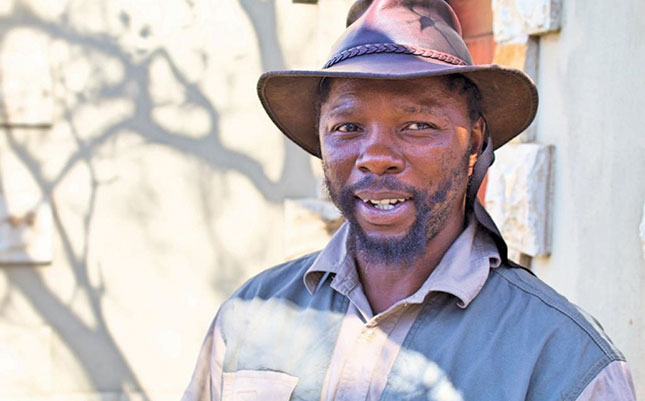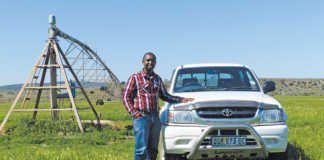
Of all the things that Willem Klaase has learnt on his journey to becoming a successful livestock and potato farmer, the one that stands out is that we are all responsible for realising our own dreams.
“People have helped me over the years, but there have also been setbacks and those who worked against me. Through all of this, I learnt that I am responsible for my own destiny. I can’t wait for other people or the government to realise my dreams,” he says.
Today he has reaped the benefit of perseverance, and his family are majority shareholders in the Welbeloon Boerdery Trust which owns De La Rey farm near Aurora in the Sandveld.
Willem had always wanted to farm. He and his wife, Martha, grew up in the Richtersveld, where their parents kept a few sheep on communal land. He remembers the response of his parents when the children in his family wanted puppies on the arrival of new litters of pups in the community.
“They would say, ‘People choose animals, not the other way around’.”
Willem says this principle has profoundly influenced his approach to farming. “There are many horror stories of farmers who neglect their animals. If you want to be a successful livestock producer, you need to see your animals every day. It is your responsibility to make sure they have enough food and water. If you can’t do this, downscale the unit to a more manageable size. You have chosen the animals, the animals haven’t chosen you.”
Small beginnings
Willem’s farming career started in the early eighties. “Martha and I lived on the West Coast and used to buy milk from a white farmer in the region, Dirk (Bul) Pienaar. As a child I had worked at one of the De Beers’ dairies after school. I missed working with animals, so I used to go early to fetch the milk, so that I could help Bul in the dairy.”
One year, when a number of lambs on the farm were orphaned, Willem asked Bul if he could buy a few.
Dirk, a man with a reputation for being difficult, refused at first, arguing that the lambs were too young to be sold for meat. But once Willem made it clear that he wanted to farm the sheep, Dirk sold him nine ewes and a ram at R10 each, and supplied Willem with free milk for the sheep. He sent the sheep off with an injunction to “go out and become a farmer”, which Willem took seriously.
Willem was working for Portnet at the time and living in one of the company’s houses. He worked during the day, while Martha, pregnant with their son Alberto, looked after the lambs. While they have two other sons, Wilbur and Hamilton, as well as a daughter, Marga, the couple think that Alberto has an especially keen eye for animals because of the time he spent with the lambs.
“He can identify a quality animal without even seeing its performance on paper and can tell you exactly which sheep came from which ewe or ram by just looking at them,” says Martha.
Health inspectors visited the plot and regularly ordered Willem to take the sheep away. But he stalled for as long as he could, using various delaying tactics each time he was told to move the animals. In this way, he managed to keep the lambs with him for three months, after which time Bul offered him temporary animal accommodation until he could find a better place. From then on, Willem started renting land.

Willem owes much of his success to Martha, his wife of 37 years, who took care of their livestock while Willem worked full-time.
Land troubles
The first leased land he acquired had more than enough water and pasture. “It was a wonderful time. Things really couldn’t have gone any better,” he recalls.
The farmer gave him six months to stay, but he managed to extend this to eight months. Finding suitable land to rent after this proved difficult. Willem had to struggle with various problems such as lack of water for the animals.Some of the landowners were difficult to deal with and had little consideration for what it means to farm stock.
Once Willem was given two weeks’ notice by the landlord, a business owner. He had over a hundred sheep at that time, so it was extremely difficult to find new land at such short notice. Willem believes that it was this crisis that might have been the catalyst that set him up for a better future.
“I was at my wits’ end and didn’t know where to go. Bul Pienaar then advised me to rent land earmarked for a housing development near the quarry close to Vredenburg. A white farmer was keeping his animals there, so Bul advised me to get a lease contract from the Department of Agriculture,” Willem says.
Bul helped Willem in many ways, from water supply to advice on animal production. He also helped with animal health advice on vaccines and medicines to use when the animals were sick. This proved very useful, according to Willem, as sheep in the Sandveld are susceptible to different diseases from those in the Richtersveld. Bul also arranged for Willem to make purchases on his account at the local co-op so he could benefit from farmers’ discounts. At shearing time, Willem and Bul shared the shearing team.
Then, around 1989, when Willem thought he would never get a formal lease contract from government, the Western Cape Department of Housing gave him a land contract after removing the animals of the previous (white) farmer. This was renewed annually. Willem built his flock to over 300 ewes and bought in about 30 cattle and 40 goats while leasing.
Things were going well for Willem and Martha until a few years after democracy in 1994. At that time, there was a dramatic increase in stock theft and a rise in problems with dogs. The land he leased was close to an informal settlement and he started losing animals weekly.
“The people had no regard for the animals. They didn’t care whether the ewes were in lamb or not. It got so out of hand that a policeman advised me to move my things before I did something I regretted,” he says.
From 2006, he applied unsuccessfully for a government grant to get his own farm. Government finally asked him to look after the farm Drommelvlei near Aurora until beneficiaries were identified.
“I agreed, as the stock theft was getting the better of me. There were so many animals by then, that I couldn’t herd them to the new farm. A farmer helped me with transport, for the cost of the fuel,” Willem recalls.
In 2009, Government gave him an option to enter a five-year lease agreement for Drommelvlei, or form a trust and gain ownership of De La Rey. Drommelvlei has an area of more than 1 700ha while De La Rey has about 850ha. Still, the infrastructure at Drommelvlei was fairly dilapidated.
“I had many discussions over which to choose, but it boiled down to the fact that I didn’t have the money to fix the infrastructure. The land wouldn’t have been mine, so I couldn’t borrow money from a bank to restore the place,” Willem says.
De La Rey was then transferred to the Welbeloon trust, which consisted of 49 shareholders.
“Most of the trust members, except for my family, had no interest in farming. They knew that we needed the numbers so that I could get hold of the land.”
Recently, the rules of the trust have been changed so that Willem can buy out the other shareholders over time. “This would be my ultimate dream come true. To have a farm that I can leave to my children,” he says.
Production
De la Rey was originally a potato farm, and neighbouring farmers advised Willem to plant potatoes. He was hesitant, as he had never grown anything before. Fortunately, one of the farmers, Stef Stephan, came forward to help him.
“I believe people should farm something for which they have a passion. If you’re not going to do that, you’ll need somebody strong to cover your back,” he says.
The two men are in a partnership in which Stef manages the land preparation and the planting and helps Willem with marketing. Potatoes for processing are supplied to Simba and table potatoes are supplied to the fresh produce market. Some of the potatoes are also sold via Stef to major retailers.
Willem says that potato production is complex and scientific: “You need to supply just enough water and sufficient nutrients. Stef and the chemical consultants fortunately help me a lot with this.”
There is enough water to irrigate 280ha on the farm, but only 20ha of potatoes are planted each year as potatoes need a five-year rotation to break disease cycles.
A variety of grains are planted during the rotation. There is also 200ha under dryland production. Potatoes and stock are complementary programmes, Willem explains. “We’re still experimenting with different grains and trying to identify which would be best for our production conditions.”
Willem feels strongly that marketing is very important if one wants to be a successful farmer.
“Stef has shown me a new side of farming, he has taught me the importance of being business-minded. His advice to aspiring farmers is to go out and start farming: “Start small and do what you can.”
For more information, phone Willem Klaase on 083 234 6096.












